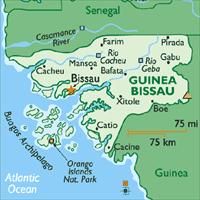GUINEA-BISSAU: Testing without treatment – an island’s dilemma

Saico Djau is deeply frustrated. He is a laboratory technician and HIV counsellor at the Marcelino Banca hospital on Bubaque Island, the second largest in Guinea Bissau's Bijagos Archipelago. After testing people he informs them of their status but for those found to be HIV-positive there is little more he can do.
Antiretroviral treatment is not available on any of the Bijagos islands. He can only give people the news and send them back to their villages, scattered on 80 islands, where some 35,000 people live.
Pregnant women return home with the likelihood that they will pass the virus to their babies.
"I feel so bad about it," Djau told IRIN. "I have no way of helping a pregnant woman to have a healthy baby."
Antiretroviral drugs (ARVs) are available in the capital, Bissau, and two other towns on the mainland. But Bubaque is five to six hours away by motorised canoe from Bissau and the life-prolonging drugs cost more than what most of Bubaque's residents can afford.
"Going to Bissau for treatment is impossible for economic and psychological reasons,” Djau said.
About 100 metres from the room where Djau's does his basic testing and counselling is the hospital’s tuberculosis (TB) ward, where nurse Joao Domingos is equally frustrated.
Domingos can treat TB patients and send them home with anti-TB pills and food parcels, but many of the patients are also HIV-positive. Domingos knows that the TB may be cured but another opportunistic infection is likely to strike.
ARVs still scarce
Testing people for HIV without being able to provide them with ARV treatment was a common problem across sub-Saharan Africa 10 years ago, when the price of the drugs were out of most people’s reach.
Today, ARVs are comparatively inexpensive and accessible but not in Guinea-Bissau. As of November 2007, 776 people were on ARVs, more than half of them in Bissau. And in a country of 1.4 million people, with an HIV-prevalence rate of around 4 percent, services to prevent mother-to-child transmission are available only in the capital.
"Ideally, the whole package of testing and treating should be implemented throughout the country, but many factors militate against this,” said Magda Queta of the National Secretariat for the Fight against AIDS. “We can't wait to have everything in place before we start testing.”
Adrien Were, the Bissau representative of the Global Fund to Fight HIV/AIDS, TB and Malaria, explained that his organisation and the World Bank pooled resources for AIDS in five priority regions, leaving the remaining six – the Bijagos Archipelago among them – for other donors to provide resources at a later stage.
But even in the priority regions the results have been sluggish. Money was available to buy materials but getting them to Guinea-Bissau was fraught with difficulty. Coordination, monitoring and logistics are the main problems, Were said.
A nurse with 38 years of experience, such as Domingos, earns 27,900 CFA francs (US$61) a month, and civil servants’ salaries are frequently paid three or four months late and sometimes only after they go on strike.
The frustrations of Djau and Domingos pale compared to those of HIV-positive patients. "To know you are HIV-positive while not having access to any support or treatment may make your health worse," said Indira Gomes Sambú, head of INDE, a Portuguese non-governmental organisation that provides home-based care in the capital.
On the other hand, she said, testing is still important in itself. "An HIV-positive person who understands AIDS will be more careful not to infect others."
 Back and Next - Back and Next
Back and Next - Back and Next See Also - See Also
See Also - See Also